Blind Anger
Posted by apgaylard on July 13, 2008
In the second part of my journey through the arid valley of the recent ‘Scientific Research in Homeopathy’ conference under the guidance of the philosophically myopic Lionel Milgrom we’ll see that the philosophical element of his apologia (powerpoint file) is empty, inconsistent, contradictory, inept and misleading.
The other bits are no better either. (Milgrom’s lecture has been skillfully deconstructed on the quackometer by Andy Lewis)
Milgrom claims that it’s time for homeopaths and other CAM advocates to get angry: it seems his anger has blinded him to the weakness of his arguments.
He wishes to characterise those who argue that homeopathy is unsupportable from the perspectives of basic science and clinical trials as, “unscientific; indeed … anti-scientific.”
How does he approach this task? In true CAM style he appeals to selected positive testimonials from some MPs who are in favour of maintaining homeopathy as part of state-funded medicine in the UK. This is no more than a slightly dressed up appeal to misleading authority.
Then he accuses prominent critics of homeopathy as being, “a tad economical with the truth.” This, as we shall see, is deeply ironic. What does he cite as evidence to support this accusation?
He seems most put out that some commentators have said that homeopathy can be dangerous, deadly even, if used for malaria prophylaxis or as a replacement for conventional treatment of life-threatening conditions.
To make the case that this is at all, “economical with the truth” I would have thought that Milgrom would provide evidence of the effectiveness of homeopathy for malaria prophylaxis; or the case for homeopathy as an alternative to conventional treatments of potentially deadly diseases. But no, instead we have a slide headed “The benefits of modern medicine” which provides a one-sided view of the risks associated with modern medicine.
This is a classic non sequitur; just because modern medicine comes with risks it does not follow that homeopathic malaria prophylaxis is not potentially lethal. Neither does it mean that a homeopathic placebo is a safe substitute for conventional treatments of serious illnesses.
It is also clearly intellectually dishonest to discuss the risks of real medicine without reference to its benefits. Nothing in life is risk-free; every potential benefit comes with a risk. This can be a particularly acute dilemma when facing life-threatening illnesses; such as someone with cancer weighing the risks and benefits of surgery or chemotherapy.
In fact, Milgrom is also peddling the Nirvana fallacy; comparing actual real-world treatments with a non-existant utopian solution.
It is also undeniable that medical professionals will make mistakes, sometimes lethal ones. Drugs that have powerful, and beneficial effects, also have the potential for serious side effects. It is also true that hospital acquired infections are a real problem in the UK. Neither are the ethics of the pharmaceutical industry beyond reproach. There are serious issues to debate here; unfortunately Milgrom is unable to offer anything more than cheap rhetoric.
Before moving away from this point it is important to remember that not all homeopaths are happy with homeopathic malaria prophylaxis. Peter Fisher, clinical director of the Royal London Homeopathic Hospital, reportedly told Newsnight “I’m very angry about it because people are going to get malaria – there is absolutely no reason to think that homeopathy works to prevent malaria and you won’t find that in any textbook or journal of homeopathy so people will get malaria, people may even die of malaria if they follow this advice.”
I wonder, is Lionel Milgrom angry with him as well?
In common with many homeopaths, Milgrom also has a problem with vaccination. He cites as part of his argument against genuine pharmacology, “….MMR and the attempts to discredit Dr Andrew Wakefield”.
Wakefield’s work has been so thoroughly discredited that it is not worth commenting beyond the observation that by levelling this charge Milgrom has further discredited his own arguments.
The anti-vaccine rant, i.e. “The vaccination myth?” is essentially a warming over of “The Social Theory” promoted in the UK by Thomas McKeown. This sort of argument has been addressed by more qualified commentators (See Le Fanu (1999) for example). All that I’d like to add are a few straight-forward observations:
-
Improvements in, “sanitation, sewage disposal, and distribution of food and water” were driven by scientific discovery (like John Snow‘s famous work on the Broad Street Pump, for example).
-
Some of the medical interventions made before vaccines were available proved effective – For example the isolation of consumptives in ‘poor law’ infirmaries in England and Wales, from the late-19th century, contributed in the decline of tuberculosis in these countries.
-
Given that perhaps the bulk of improvements in this regard pre-dated vaccination, why turn our back on the possibility of making further improvements; or are we just to live with certain diseases being unnecessarily endemic?
-
This type of analysis tends to focus on evidence from the US and Europe. What about the successful use of vaccines to all but eliminate Hib meningitis in young children in Uganda? The global eradication of smallpox? Or the 60% reduction in measles deaths among African children (the WHO are reported to have concluded that, “Vaccination campaigns that began in 2000 have saved the lives of just over 1 million children in the part of Africa south of the Sahara desert.”)
Milgrom is just plain wrong to infer that vaccination has not brought huge benefits to humanity.
Next comes his rant against the meta-analysis of Shang et al. I have already dealt with this at some length. What is interesting is the appalling asymmetry of his sloppy scholarship: when it comes to Shang he focuses on now-irrelevant criticisms that have been answered by the author; in dealing with the purported ‘Memory of Water’ relevant criticisms are ignored and flawed studies are cited with great gusto.
This just demonstrates that Milgrom is happy with experimental observations and clinical trials as long as they confirm his beliefs. The quality of the evidence be damned: it’s the confirmation of prejudice that counts.
Now we come to Milgrom’s tenuous grasp of the philosophy of science.
Here Milgrom accepts the objective of eventually being able to, “explain homeopathy in scientific terms.” In doing so he imlicitly concedes that there is worth in the values and methods of science; he implicitly accepts that worthwhile objective evidence can be extracted from nature via experiment.
Otherwise, why try at all? Why have a conference called ‘Scientific Research in Homeopathy’? Why bother citing all those studies on alleged memory effect in water?
It’s good to remember this because Milgrom goes on to change his mind and mistrust science, its values and methods.
This process starts on this slide when he raises the issue that assumptions made in the scientific process may colour the results obtained. It is important to note that for Milgrom the question never arises when the trials or experiments confirm his beliefs. It’s only nasty, conventional, sceptical science that suffers from philosophical problems. How convenient!
He starts by raising the well-known problem of induction. For those not familiar with induction and its counter-part, deduction – here’s a version of a simple diagram from my undergraduate text on the philosophy of science. [Chalmers (1985)].
Notice how deduction is important in the use and testing of theories: a prediction may be deduced from theory and then tested to see if it is correct. This is a pretty simple illustration of the role of these ideas in science (actaully it’s so simplistic its only use is as an illustration of these two concepts – it doesn’t mention hypotheses or highlight the limitations of induction, for example). Now, here’s Milgrom’s take on the problem of induction.
Milgrom claims that, “Science relies on induction!”. This is untrue. Science arguably does include some inductive processes – the generation of hypotheses comes to mind. These are then tested deductively – its the testing of hypotheses that science relies on to promote robust theories and good choices.
He opines that, “It is widely assumed that science starts with observation which provides a secure basis from which knowledge can be derived via induction.” Well people, even some scientists may assume this – but it’s not the way science actually works. Even my simple figure illustrating the concepts of induction and deduction shows that even an overly simplistic model of science does not leap inductively to knowledge: predictions and explanations are deductions.
Milgrom’s description is simplistic and incomplete. In recent months I’ve been on a bit of a philosophical journey (prompted by a previous outburst from Milgrom). It has become quite evident to me that science is too rich, diverse and complex human endeavour to be forced into simple philosophical boxes. All philosophical descriptions of science are flawed in one way or another. However, philosophy can provide useful insights: but to have any chance of being useful a philosophical system must be more than the one-dimensional caricature that Milgrom provides. Once more he purposefully overlooks the more complex and relevant descriptions provided by the work of philosophers like Lakatos and Kuhn, to construct a trite straw man.
Also the philosophical description of science that we favour (if any) won’t change the outcome of experiments, or clinical trials. These are based on values common to scientists, irrespective of their philosophical leanings -or lack of them.
He also says that, “But David Hume (18th C) argued it is all a matter of CUSTOM or HABIT and that the use of induction cannot be rationally justified at all!” This is to define rationality as being exclusively deductive, which again is too simplistic: who doesn’t expect the sun to rise tomorrow based on their previous experience. This is a rational and useful induction. Induction does have limits and weaknesses, but to deny it is to deny the rationality of experience-based judgements.
When he adds that, “Science doesn’t ‘prove’ or ‘disprove’ anything: the word ‘proof’ should only be used when describing deductive logical operations, like maths.” He is just plain wrong again. It is quite possible to disprove, or falsify. It’s not as straight-forward as Popper made it out to be, but it does happen.
Also, ‘proof’ has more than one meaning. Yes, it can be the deductive proof of mathematics or formal logic. It can also be ‘proof’ of the sort that can put a person behind bars: ‘proof’ based on evidence, reason and the absence of reasonable doubt. It should be clear from the context which meaning is intended, but to limit the word to the application of deductive logic is to deny the richness of the scientific discourse.
As Kuhn (1996) observed, “Debates over theory-choice cannot be cast in a form that fully resembles logical or mathematical proof.” To try to insist that it should is to ask for the impossible.
(As an aside, in case anyone is tempted to see the quote above as a negative commenty on the rationality of science, Kuhn added that, “Nothing about that relatively familiar thesis implies either that there are no good reasons for being persuaded or that those reasons are not ultimately decisive for the group. Nor does it even imply that the reasons for choice are different from those usually listed by philosophers of science: accuracy, simplicity, fruitfulness and the like”.)
The use of the word ‘proof’ to mean a strictly deductive process is certainly not seen among homeopaths and CAM advocates. For instance, homeopaths call their fantasy trials of potential new remedies ‘provings‘. The words “clinically proven” are also seen in the marketing hype for some CAM gizmos.
It would add a veil of respectability to Milgrom’s arguments if they were at the least to apply equally to everyone.
Finally his observation that, “Offering a ‘reward’ to ‘prove’ homeopathy/CAMs work is a just a stunt” is false. The “Ernst-Singh £10,000 Homeopathic Challenge” doesn’t ask for ‘proof’, “We challenge homeopaths to demonstrate that homeopathy is effective by showing that the Cochrane Collaboration has published a review that is strongly and conclusively positive about high dilution homeopathic remedies for any human condition…” So here we have mis-direction from Milgrom.
(Also, Randi’s reward does not even require clinical effectiveness: just proof beyond reasonable doubt that ultra-molecular homeopathic solutions are different from the solvent.)
This is a very naïve commentary on naïve inductivism. Science does not, “work like that”. Part of the motivation for the work of Kuhn, Feyerabend and Lakatos was that they could see that science didn’t work like that – no matter what some scientists claimed.
Kuhn, particularly, based his philosophy on a clearly historical approach – trying to see how scientists had actually worked and continued to work. He was actually a historian of science before he was recognised as a philosopher of science
Popper is indeed famous for propounding the principle of falsification as a solution to the problem of induction, though some commentators suggest that this was not an original contribution. It is certainly a weakness in Popper’s scheme that some theories are born ‘pre-falsified’ – he was at least aware of it.
Others explicitly worked on this problem. For example Lakatos’ philosophical model – the Methodology of Scientific Research Programmes – specifically incorporates a description of how the core hypotheses of a research programme are protected from premature falsification.
So Milgrom raises a red herring; ideas on how to face this issue had been developed by the early 1970s – if he had actually read the works he lists in the published version of this rant he should know that. So he is being disingenuous here: either he knows better and pretends not to, merely to serve his argument; or cites references he’s never read. This goes beyond sloppy scholarship.
Now, this criticism of Ernst is really poor. First, note the source for the quotation: it is not in a philosophical treatise or a learned journal, it’s in a newspaper. Perhaps it’s not fair to treat this as a definitive philosophical position piece. However, the worst is yet to come: Milgrom is being selective to suit his argument. Have a look at the complete quotation carried in The Times.
“I don’t believe in anything that I can’t prove. My only true belief is in science and its ability to sort out belief from fact. Part of my fascination with alternative therapies stems from the fact that some of them have not yet been proved. My job is to establish whether or not they are evidence-based. There is no aspect of belief in this at all. If there is, it gets in the way and becomes a bias. Once you have tested and established your hypothesis, you try to disprove it. If you can’t, you do the test again before you consider believing it. If you find the results contradict your belief, you abandon it – or you’re a fool. This is why I am convinced of the power of placebo. I have done trials with patients who suffer from intractable pain. A portion of them, who were seen by actors pretending to be spiritual healers, improved so significantly that some were able to abandon their wheelchairs. This is this kind of proof I look for before I believe in something.”
Edzard Ernst quoted in “What scientists believe but can’t prove . . .”, The Times, December 24, 2005 (emphasis mine)
In a recent letter published in the pseudo-journal Homeopathy Milgrom used this partial quote to as a proof by example that Ernst -and many other scientists – are naïve inductivists. This is again implied by the way it is used here.
Is Ernst saying that he follows a naïvely inductivist approach to his work? No, in the full published quotation he actually talks about falsification and the abandonment of falsified hypotheses. This is a pretty reasonable explanation of a scientific approach for a lay audience in an informal article.
Is this logical positivism? No; one of the central tenets of the logical positivists was verificationalism – the idea that to be meaningful, a non-analytic sentence has to be empirically verifiable. In essence this is an inductive view and explains, in part, why Popper is credited as being a harsh critic of the logical positivists. As we can clearly see in reality Ernst takes the opposite, falisificationalist, view, “Once you have tested and established your hypothesis, you try to disprove it. If you can’t, you do the test again before you consider believing it.”
Is he talking about proof in the deductive mathematical or logical sense? No, it’s clear from the last sentence that he is talking about judgement based on objective evidence. This kind of proof is similar to the legal, rather than mathematical kind.
Is this unambiguously scientistic? No. Rather than asserting the authority of science over every part of life, Ernst is talking against the backdrop of his work as a scientist.
Would it really matter is he was? No. Because the issues that Milgrom raises are about the application of science within modern medicine, which is a discipline with a scientific core i.e. medical science. This is not about science transgressing the boundaries of myth, religion or magic. It’s about Milgrom and his fellow CAM advocates trying to import quasi-religious belief systems into the domain of science.
The part of the quotation that Milgrom has chosen not to show is revealing. Why would he only use part of this quote? Well, it is the only way he can try to support his argument. This is more than “a tad economical with the truth” and is also a good example of the fallacy of contextomy.
The first bullet point is not necessarily talking about induction. By saying that, “Scientific beliefs stand or fall in the light of this evidence” he could equally well be talking about any of the serious proposals made by philosophers of science during the 20th century. Popperians would agree with the, “or fall” idea; it fits nicely with Lakatos’ concept of progressive and degenerate research programmes; even Kuhn would be happy with this as the basis for theory-choice: “It makes a great deal of sense to ask which of two actual and competing theories fits the facts better.”
So this view is not, “based explicitly in the early 20th C philosophy of logical positivism.” The approach of deciding what is correct based on carefully collected evidence is, as Kuhn noted, one of the defining characteristics of science in general – regardless of the particular philosophical stance taken by the individual scientist.
To argue against the possibility of obtaining objective evidence about the world and making judgements based on it is to argue against science in general and, by the way, all of Milgrom’s own points about any putative ‘Memory of Water’ or sucessful clinical trials of homeopathy.
So, here is the denouement of Milgrom’s thesis. He claims that EBM (or a particular variant of EBM – note now he’s talking about EBM generally) is founded on logical positivism – a debunked philosophical concept – and is therefore flawed; so somehow homeopathy is OK.
What we have seen is that the single example he provides of a ‘logical inductivist’ scientist is based on the dishonest use of a quotation in a newspaper! All he has managed to show is that EBM has values that are consistant with science generally. Any criticisms of the reliance of science on judgements made on observations applies equally to the science he likes – positive clinical trials of homeopathy and measurements that aledgedly show water has a memory.
So by this point Milgrom is done. He has nothing but a tenuous thread of logical fallacies, misconceptions and false evidence. But, of course, he ploughs on regardless.
Now, the statement that, “Developments in the philosophy of science since the 1920s have posed serious challenges to logical positivism” is one of the few things in this presentation that I can agree with. However, we have seen that logical positivism cannot, and has not, be explicitly identified with EBM. So to stretch this to saying that “developments in the philosophy of science” challenge EBM is to simply false.
Here also, Milgrom gets his philosophy totally wrong when he says, “and particularly from Post-Modernists – Foucault, Derrida, Feyerabend, Lakatoé, etc)”
Lakatoé, more usually known as Lakatos (though perhaps an improvement on his earlier attempt: Latakos) was certainly no post-modernist. His lecture on science and pseudoscience is well worth a read and should demonstrate the point very clearly.
Feyerabend was not a post-modernist either, at least during the most influential part of his career when he was a philosopher of science. Some argue that his later works strayed into that school, but that is moot as it is his treatise “Against Method” that Milgrom cites in the published version of this rant. At this time he described his philosophy as anarchist and Dadaist, the latter school can be seen as a, “prelude to postmodernism.”
These may seem like small points, but they illuminate the standard of Milgrom’s scholarship: he either doesn’t bother to read the sources he cites or doesn’t understand them.
The, “recent Post-Modernist deconstruction of EBM discourse” which “compares it to a ‘fascist’ structure for its intolerance of pluralism in healthcare systems” has been dealt with at length by Ben Goldacre. Milgrom seems to keep forgetting that any deconstruction that undermines evidence also undermines any he would cite for the memory of water.
(To assess the credibility of the post-modernist assault on science, I’d direct readers to Sokal & Bricmont’s excellent “Intellectual Impostures“.)
Inevitably, he has a brief quantum interlude. Anyone who is tempted to think that Milgrom knows what he is talking about on this topic should consult to work of Chrastina and Leick.
Now Milgrom moves on to undermine the notion of objectivity in observation. A futile aim, as it hurts the evidence that homeopaths love to cite as much as anyone else.
It’s notable again that his reading of the philosophical works he quotes is questionable. In citing Kuhn after his definition of ‘paradigm‘ he makes clear that he’s not read (or remembered) Kuhn’s 1969 Postcript to The Structure of Scientific Revolutions.
His arguments about the social nature of evidence and theory-choice do not reflect Kuhn’s views. Kuhn makes it clear that whilst individuals are subject to social and cultural biases that decisions in science are made at a group level, reducing their impact.
(There’s much more to say about what Kuhn really said. If anyone is interested I explored this in a series of posts, after an invitation from a homeopathy advocate who seemed to lose interest.)
Next Milgrom returns to a familiar theme, “Hence positive results from even the highest standard RCTs in homeopathy will be rejected by those who do not ‘believe’ in the possibility that ultra high dilutions can have an effect. Catch 22!”
Milgrom made a similar assertion in an earlier publication. I was surprised; the best evidence is that the better the standard of the RCT the more negative the conclusion about homeopathy. So I asked, in a letter which appeared in Homeopathy, for the references; his reply ignored the request. This, I think, demonstrates that Milgrom is again indulging in empty rhetoric.
This is nothing more than a faux-Kuhnian position. (To see what Kuhn really said see my previous posts).
Remember that Milgrom started out by claiming that detractors of homeopathy were, “anti-scientific”. By calling science, “a conformist society which represents only the curently accepted paradigm” and embracing post-modern deconstructions of science I’d say that Milgrom is revealed to be “anti-scientific”.
In any case, its clear that he is mis-characterising science.
Science is really a complex, diverse, dynamic, technical, human enterprise. It is undertaken by communities that share a deep commitment to core values and have developed both common (like blinding) and unique tools that accord with these values. The community-based nature of its judgement process diminishes the influence of individual prejudices, cultural and social pressures.
It is a progressive enterprise that is open to change and new ideas, but doesn’t accept them until they have proven their worth. It is conservative in the sense that it holds onto ideas until something better comes along, to avoid chaos and maintain progress.
It bears no real resemblance to Milgrom’s crude and simplistic caricature.
Milgrom’s conclusions are entirely worthless. We have seen that they are based on fallacious reasoning, sloppy scholarship, bias, error and misunderstanding. Also, in any event, homeopathy in particular and CAM in general don’t practise what Milgrom preaches.
To illustrate this, consider Dr Alexander Tournier’s presentation (covered nicely by gimpy), at the same event: “Overview of the current state of the research in Homeopathy”. Here is his slide on the, “Scientific discovery process”.
This is naïve inductivism pure and simple. There is no use of deduction to test hypotheses. Actually, this scheme ignores hypotheses and goes straight to theories! The dotted yellow line seems to infer that homeopathy has not progressed to the point where deductions could be made from their theories.
This slide criticises views that he perceives as not, “grounded in observation”. This is pleading the case for induction. It is also clear that Tournier has no problems with observation, or for that matter the idea of non-deductive proof (See below – ‘provings’).
Perhaps Tournier and Milgrom ought to get together and decide what they believe, before lecturing everyone else.
In fact, to me, it seems like the homeopathic community are on a myopic inductivist quest; building their ‘evidence base’ one poor-quality cherry-picked study at a time.
It’s sad that Milgrom seems so angry. It appears that it has rendered him blind to the need to actually read the philosophers he quotes, take care to be consistant, get aligned with his colleagues, construct his arguments properly, think straight and not be, “economical with the truth” himself.
References
A F Chalmers (1985), “What is this this called Science”, 2nd ed., Open University Press.
J Le Fanu (1999), “The Rise & Fall of Modern Medicine”, Abacus.
T S Kuhn (1994), “The Structure of Scientific Revolutions”, 3rd. ed., The University of Chicago Press.
A Sokal and J Bricmont (2004) “Intellectual Impostures”, 2nd. ed., Profile Books Ltd.
16 Responses to “Blind Anger”
Sorry, the comment form is closed at this time.






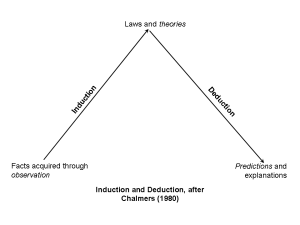
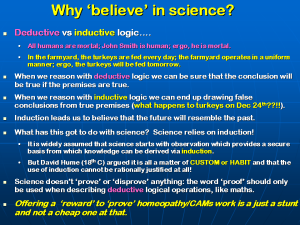
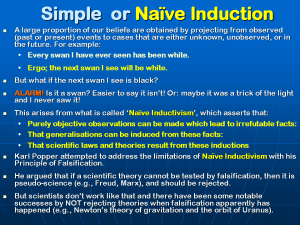

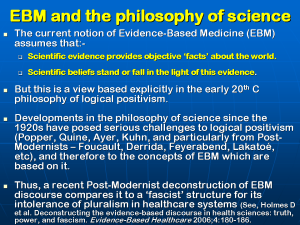
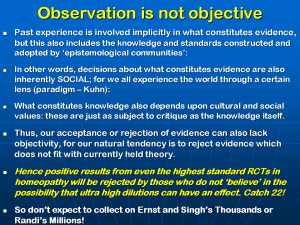

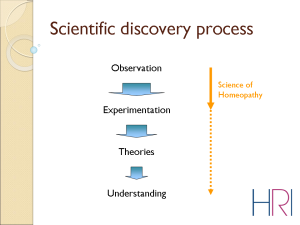
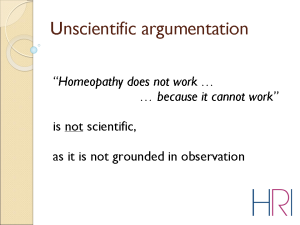
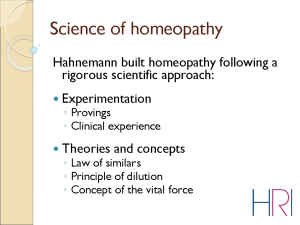
gimpy said
Absolutely magnificent and comprehensive demolition of the pseudo-philosophy of the scientific wing of homeopathy. However, I suspect as long as they surround themselves with favourable audiences and publish in favourable journals they will keep at bay that nagging sensation they must have in the neocortex trying to jump start their critical faculties and telling them that, you know, it doesn’t really make sense.
apgaylard said
gimpy:
Thanks. Your Tournier piece pointed me at the contradiction between the two. I do wonder if anyone was awake and spotted that Tournier is an inductivist?
The biggest surprise for me was the selective quotation of Ernst. Unpleasant. And Milgrom’s been moaning that I don’t play nice.
I think I’ll write a letter to J. Alt. Comp. Med. and make a couple of points; not that anyone is listening.
Still, some improvement in Milgrom’s philosophising: he doesn’t call Popper a post-modernist anymore and he has now at least heard of Lakatos – even though he’s clueless about his work.
draust said
Crumbs. I really do wonder about Lionel’s association w Imperial. Obviously it relates to his former life as a porphyrin chemist, but I do wonder how they feel about the homeo-nonsense. As usual, I have great difficulty working out what would make someone go from a 25+ year career of solid chemical research in porphyrin colour chemistry to embracing Woo in the most florid way… although one would suspect a personal experience of illness and “Woo-cure” c. 2002-3.
Of course, one might note that from having been a respectable porphyrin scientist, but presumably one among many, Lionel is now a genuine front-rank research “celeb” among deluded homeopathy defenders. That is, as science has been replaced by ill-understood quantum regurgitation and misquoted philosophy, he has become “an authority” in his, er, chosen field.
Which tells you everything you need to know about the general calibre both of the scientific defenders of homeopathy, and of the “journals” where they publish their work.
dannychrastina said
This post’s so good that I immediately went and edited my most recent blog post to put in a link to it.
wilsontown said
Yet another excellent post.
A minor point regarding Fisher’s comment regarding malaria: “I’m very angry about it because people are going to get malaria – there is absolutely no reason to think that homeopathy works to prevent malaria and you won’t find that in any textbook or journal of homeopathy so people will get malaria, people may even die of malaria if they follow this advice.”
In fact, the journal “Homeopathy” (editor P. Fisher) has this paper, suggesting that homeopathic substances could be “good candidates as alternative or complementary medications in the treatment of malaria”.
Naturally, the paper is totally useless, as it is unblinded and each group contains only four subjects (mice, in this case).
Apart from that, of course, it was Hahnemann’s experience using Cinchona bark as a treatment for Malaria that led him down the blind alley of “like cures like”. So Fisher’s comment that “you won’t find it any textbook or journal of homeopathy” is perhaps somewhat disingenuous.
apgaylard said
draust: It’s sad that someone who was clearly a well regarded academic chemist has lowered himself to the rhetorical tricks and other nonsense evident in his lectures and publications. He’s clearly had a better education that I have and been a better scientist than I’ll ever be. It’s one thing that he gets his quantum mechanics, weak or otherwise, wrong. It’s another to be so clearly wrong about things that are easy to check.
dannychrastina: Thanks. Honoured to be referenced on your blog; particularly as it seems that one of my comments has led Milgrom to take a dim view of the level of debate there! I’d dearly love to see him engage properly with your critique.
wilsontown: An inconsistant homeopath – who would have thunk it! I guess that it’s one thing to respond to a ‘broadcast’ audience about the wisdom of homopathic prophylaxis for a serious and not uncommon (in some parts of the world) condition and another ‘narrowcasting’ to the converted about ‘potential’ treatments? In the former case you’ll get found out very quickly, in the latter there is a degree of plausible deniability (research article, animal model, etc.) – an example of homeopathic doublethink?
Thanks to all for your generous comments and interest.
metherton said
What strikes me is what a stunningly boring lecture it must have been. It looks as if he just read out nearly 30 slides. Even if his audience was entirely made up of the converted most of them must have been asleep by half way through.
dvnutrix said
This is truly remarkable. We have just been trudging through a newsletter from Holford that someone was kind enough to send us (albeit to demonstrate how much more moderate his anti-vax stance has become – a point on which we dissent). Following holfordisms are taken from “Vaccinations: what every person needs to know”, 100%health Newsletter, No. 46, July 2008, pp. 5-8.
Milgrom – Lakatoé/Lakatos
Holford – de/da Vinci
Milgrom – logical positivism
Holford – reductionism
Milgrom – “….MMR and the attempts to discredit Dr Andrew Wakefield”.
Holford – “…MMR vaccination…experts trying to discredit [Dr Wakefield] and his findings”.
However, we can see your “there’s no problem because social theory has taken care of preventable childhood illnesses” and raise you “supplements make your kid invulnerable”.
Plus, we are putting together a serial on Holford’s vaccination advice and it is full of partial truths or quotations (e.g., he discussed Hannah Poling without mentioning her underlying mitochondrial disorder).
As per Milgrom and his understanding of scientific evidence, Holford has issued a Special Report to complain about the Cochrane Review of Antioxidant Supplements and Mortality.
Are these people all using the same playbook?
apgaylard said
metherton: Thanks for the comment. I’d hope that they were all asleep; it’d be the only permissible excuse for not spotting the specious nonsense.
dvnutrix:
I think that there is a single lexicon of woo somewhere. Many of the more prominent spokespeople do seem to peddle the same rubbish.
I was quite amused that Dr Damien Downing (it’s at the end of his long rant) asked me to find Shang’s lancet letter responding to critics. It seems to capture the essence of the levels of scholarship that these people practice.
I do think on the anti-vax front (and I was surprised at Milgrom’s anti-vax stance) that Holford’s supertots trump Milgrom’s whale.to (hmmm) sourced regurgitated Social Theory.
Thanks, as ever, for your comment.
pleick said
Does Milgrom actually state anything about the philosophy that science should have, according to him? Or is his rant only negative, concerned only with the (imagined) flaws of orthodox science?
He seems, to some extent, to adopt a post-modernist stance. He has written this explicitely in Homeopathy 97:2, and his slides favorably mention post-modern critiques of science (although he gest his list of post-modern philosophers wrong).
Now, I’m quite happy to ignore post-modernism and to discard it as “completely and brilliantly debunked by Alan Sokal”… but I’d appreciate if a competent reader could explain it in some detail.
Wouldn’t it be more consistent, for a post-modernist, to show that EBM and the randomized, double-blind placebo-controlled test are just arbitrary social constructs? Instead, Milgrom chooses to build a “scientific” theory that proves they are useless in the very specific case of homeopathy.
Contradictions, contradictions,… they’ve never bothered the CAM crowd in the least. Is that, finally, real post-modernism?
jdc325 said
Cracking post.
“In true CAM style he appeals to selected positive testimonials from some MPs who are in favour of maintaining homeopathy as part of state-funded medicine in the UK.” Brilliant – I hope the name ‘Treddinick’ appears.
“It is also clearly intellectually dishonest to discuss the risks of real medicine without reference to its benefits.” – as someone did recently in the comments on the THES article about homeopathy. It seems to be one of their main tactics.
“In common with many homeopaths, Milgrom also has a problem with vaccination.” Yes – many homeopaths [and a few nutritionists] seem to have failed the ‘MMR test’ [not to mention the AIDS test].
“So he is being disingenuous here: either he knows better and pretends not to, merely to serve his argument; or cites references he’s never read. This goes beyond sloppy scholarship.” Like the phrase ‘not even wrong’, I think ‘not even scholarship’ could be apt for the work of some CAM proponents.
Interesting that Milgrom quotes that Po-Mo rubbish about EBM being fascist* – in an electronic response in ecam, Milgrom complained of Ernst bringing up the Third Reich. Which I found ironic given his comparison of Nick Cohen’s piece about homeopathy to the Protocols of Zion. I quoted him on my blog as saying: “why bring up the Third Reich’s involvement with homeopathy now?” and “Nick Cohen’s comments on homeopathy are as ignorant and about as offensive as those who quote the ‘Protocols of Zion’ to justify anti-semitism”. The exchange between Ernst and Milgrom is here: eCAM. My blog post is here: Milgrom and the Nazis.
*I see you have linked to the Bad Science PoMo category. I thought the Po-Mo criticism of Archie Cochrane was particularly inapt: http://www.badscience.net/?p=284 [includes a link to the original paper – not that it’s worth reading].
[Incidentally: @”Milgrom’s whale.to (hmmm) sourced regurgitated Social Theory.” – oh dear – I think someone may be invoking Scopie’s Law here…]
Cheers,
jdc
apgaylard said
pleick: Milgrom’s philosopy of science seems to me to be wholly negative and, of course, only applies to the things that don’t supprt homeopathy. Observations made using Raman Spectroscopy that ‘show’ ‘differences’ between homeopathic solutions and their solvents aren’t ‘theory laden’ at all! As for a positive position – I don’t think that his thoughts are that clear. He drifts from trying to be the defender of science against a mis-interpretation of EBM and ends up as a PoMo critic of EBM.
I read Milgrom’s pro-PoMo comment in Homeopathy and was not sure what to make of it because in the end to homeopathy crowd do think that there is an ultimate truth: theirs. The retreat to relativism and PoMo criticism is just a convenient device.
I don’t think I have the time and stomach to get into post-modernism. I do have every intention of blogging about Feyerabend at some point. I’ve read “For and Against Method” which is mostly his correspondence with Lakatos; I’d heartily recommend it. I’ve just finished his autobiography – “Killing Time” – fascinating stuff. “Against Method” is next on my book pile for a very careful re-read.
jdc325: Interesting comments – I’ll follow up the references. Inconsistancy and pot-kettle conundrums do seem to be the order of the day. I like the concept of the “MMR test”; it is very telling. Invoking Scopie’s Law – moi? Perish the thought…
Thanks both. I appreciate the comments.
dvnutrix said
apg – Do you think that the shades of Kuhn and Popper are so used to their work/words being distorted that they have developed a fellow-feeling with Canute?
You’ve suggested so many interesting books that I really need to think about buying a Kindle or similar when they are available in the UK so that I have a reasonable chance of having works like this on tap for when the opportunity arises to look at them.
I promise myself that I will have read more of your links by this weekend. I liked the Lakatos lecture.
draust said
Have you noticed that almost every piece of incoherent catch-all flannel that Lionel churns out – e.g. his hilariously prolix responses on the eCAM response thread jdc linked to above – eventually turns up in even more extended form as an article or even a “Commentary” in the laughable “Journal of Alternative and Complementary Medicine”?
jdc325 said
“I don’t think I have the time and stomach to get into post-modernism.”
Thankfully, Sokal’s hoax means I don’t feel I have to. PoMo has already been ruthlessly exposed – and the embarrassed editors of Social Text were unable to respond to Sokal’s criticisms. As Wikipedia puts it: the journal published articles not on the basis of whether they were correct or made sense, but simply because of who wrote them and how they sounded.
apgaylard said
dvnutrix:
I think that Popper thought his work was being distorted during his life. He fell out with Lakatos, who he seems to have felt appropriated his concept and took it in a direction he didn’t like, and Feyerabend. Kuhn famously protested “I’m not a Kuhnian”; so we can take it he was not best pleased.
My feeling is that none of the ‘greats’ of the philosophy of science would have been very interested in the level of debate we see from homeopaths. Like them or not, if you read their works they all had outstanding intellects. For instance, I don’t like Feyerabend’s philosophy but his grasp of physics easily surpasses mine.
These were all peoaple who accepted logic and rationality (if not, in Feyerabend’s case Reason). They carefully constructed their arguments skillfully picked over the opponents.
I don’t think the sloppy, self-serving, deceitful, ignorant philosophical ramblings of the ‘scientific’ homeopaths and their apologists would have held any interest.
draust: Quite, conservation of nonsense perhaps?
jdc325: I like your style.
Thanks all.